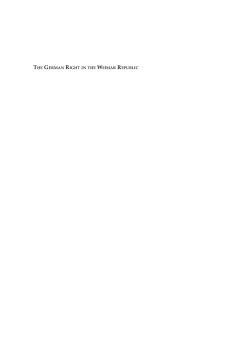
Additional Information
Book Details
Abstract
Significant recent research on the German Right between 1918 and 1933 calls into question received narratives of Weimar political history. The German Right in the Weimar Republic examines the role that the German Right played in the destabilization and overthrow of the Weimar Republic, with particular emphasis on the political and organizational history of Rightist groups as well as on the many permutations of right-wing ideology during the period. In particular, antisemitism and the so-called “Jewish Question” played a prominent role in the self-definition and politics of the right-wing groups and ideologies explored by the contributors to this volume.
“The strength of this collection is its engagement with this ideological and institutional diversity… Though not intended for general readers (who will find relatively little about Hitler and the Nazis here), specialists will benefit from this volume’s exploration of the ideas that shaped the German Right and the ways that their spokesmen negotiated their ideological differences during a period of profound societal crisis.” · Choice
“Even if not all new directions offered [by the ten interesting and well-written essays in this collection]… are ultimately completely convincing, the book certainly reaches the goal stated in the introduction of delivering valuable new insights and pointing out new challenges.” · German History
“The essays, exceptionally readable throughout, enrich the contemporary debate through numerous new facets and questions. In contrast to other edited volumes, the contributions here are all based on rich source material, which results in a book that is interesting for the general historian as well as for the specialist.” · H-Soz-u-Kult
“The individual chapters range in quality from good to excellent....[and offer] a judicious mix of work from prominent academics and younger scholars. The weighing up of continuities and discontinuities between the Right and Nazism is well considered and offers refreshingly new insights into the history of inter-war Germany.” · Conan Fischer, University of St. Andrews
Larry Eugene Jones is Professor of Modern European History at Canisius College in Buffalo, New York. He is a specialist in the history of the Weimar Republic and author of German Liberalism and the Dissolution of the Weimar Republic, 1918-1933 (University of North Carolina Press, 2011) and Hitler versus Hindenburg: The 1932 Presidential Elections and the End of the Weimar Republic (CUP, 2016). He is currently working on a new book tentatively entitled Conservatives, Nationalists, and Nazis: A History of the German Right from 1918 to 1933/34.
Table of Contents
| Section Title | Page | Action | Price |
|---|---|---|---|
| Contents | v | ||
| Abbreviations | vii | ||
| Introduction | 1 | ||
| Chapter 1 | 25 | ||
| Chapter 2 | 48 | ||
| Chapter 3 | 79 | ||
| Chapter 4 | 108 | ||
| Chapter 5 | 134 | ||
| Chapter 6 | 166 | ||
| Chapter 7 | 194 | ||
| Chapter 8 | 220 | ||
| Chapter 9 | 244 | ||
| Chapter 10 | 268 | ||
| Contributors | 291 | ||
| Selected Bibliography | 295 | ||
| Index | 319 |
